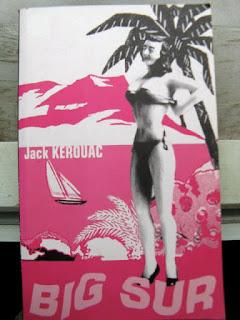This month I've been reading Dostoyevsky (The Devils, or if you prefer, 'The Possessed') and watching seasons One to Four of Mad Men.
The mad men, you will probably know, are the advertising execs on Madison Avenue in the 1960s.
The Devils has quite a few mad men of its own. The characters have conversations that go like this:
....' I love beauty. I am a nihilist, but I love beauty. Don't nihilists love beauty? The only thing they do not love is idols, but I love an idol. You are my idol! You don't insult anyone, and everyone hates you; you look on everyone as your equal, and everyone is afraid of you. That's good. No one will ever come up to you to slap you on the shoulder. You're an awful aristocrat. An aristocrat who goes in for democracy is irresistible. To sacrifice life - yours and another man's - is nothing to you. You're just the sort of man we need. I - I especially, need a man like you. I don't know of anyone but you. You're my leader, you're my sun, and I am your worm.'
He suddenly kissed his hand. A shiver ran down Stavrogin's spine and he snatched his hand away in dismay. They stopped.
'Mad!' Stavrogin whispered.
People in Dostoyevsky make mad, impassioned speeches. The samovar is always boiling. Oddly, I find them rather like people I have known. I could walk into a Dostoyevsky novel and feel right at home. Reading him is addictive.
Addictive, too, is Mad Men, though I don't think I have met people quite like this. Scheming, mad revolutionaries, yes, ad men, no. (No, I did meet one once at a posh Sydney wedding in the 70s. He was all for cigarette advertising.)
As they are in Mad Men. There, it's the 1960s - 50 years ago! - and everything is seething away under the surface. Don and Betty Draper look like the perfect young middle class couple, but it's all a facade. At the end of season three, Roger Stirling says to young copywriter Peggy Olson, 'Go get me some coffee,' and she looks up from her work and says, 'No,' firmly but without rancour.
There will be a lot of anniversaries of the 60s this decade. Sylvia Plath's The Bell Jar was published in 1963. So was Betty Friedan's The Feminine Mystique.
At the beginning of the episode titled 'Maidenform', set in a hot New York summer, someone at a party murmurs, 'This reminds me of the summer they electrocuted the Rosenbergs.'
Literary allusions in Mad Men!
'It was a queer, sultry summer, the summer they electrocuted the Rosenbergs, and I don't know what I was doing in New York' is the opening sentence of The Bell Jar.
My 40 year old copy is full of underlinings. Back then, as an eager young feminist, I always underlined sections of books pertaining to the role of women, but in this book, I can tell by what I was underlining it wasn't only that. I underlined sentences that I liked for the way they were written. I liked many of the one line sentences, what they suggested, admiring their brevity and nuance. I liked the poetry of it.
I think Sylvia Plath was teaching me how to write.
I've been thinking a lot about the 60s lately. Now, all these years later, sexism is still on the agenda. Last weekend in the Sydney Morning Herald, Anne Summers writes about how people don't have the concept of 'men who want it all' - that impossibility is reserved for women.
Which makes Mad Men and The Bell Jar (set in 1953, the summer they electrocuted the Rosenbergs) seem oddly relevant today. Lets not get too cocky about how far we've come.




